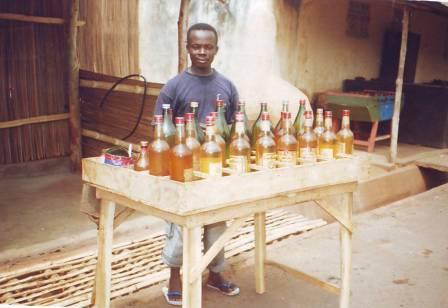 Stéphane Gouyo is a 27-year-old Togolese father of two who makes his living selling lamp fuel. As far as I can tell, he is not starving, nor dying from some readily treatable disease. Given that he's been in business for ten years, I would venture to say that he's doing rather well for himself, so well, in fact, that he recently took out a $1000 loan to expand his business.
Stéphane Gouyo is a 27-year-old Togolese father of two who makes his living selling lamp fuel. As far as I can tell, he is not starving, nor dying from some readily treatable disease. Given that he's been in business for ten years, I would venture to say that he's doing rather well for himself, so well, in fact, that he recently took out a $1000 loan to expand his business.Being a PhD candidate, I live, more or less, from paycheck to paycheck, but do find myself "ahead" some times with money to save and even, occasionally, to give to good causes. I can't say that I've ever contributed even a cent to help the truly miserable of Africa, but through kiva.org, I loaned $25 of that $1000 to Mr. Gouyo.
Giving aid to people who've fallen on hard times, or helping to fund scholarships and the like for the economically less well-off, in areas with developed economies is one thing: giving to the poor where everyone is poor is another. Human misery is human misery, yes, but helping someone on the path to success is somehow satisfying, while most Third World aid is futile. You may feed a person today, yes, but they will still be hungry tomorrow, and you will be poorer. A loan to the bourgeoisie, for lack of a better word, of the developing world, would seem to go much farther than a donation to a relief agency.
Guoyo, for one, barring some Zimbabwe-like political disaster, is not likely to become part of the problem. He and his family will not become mouths to feed, consuming wealth but lacking the means and sometimes the initative to produce it. Rather, he will raise the standard of living for his family and his countrymen. His children, and their children in turn, in a sort of Togolese version of the American Dream, will likely have opportunities he did not, to learn skills to make more productive (in the economist's sense) and hence wealthier. He may someday hire an employee or two. The kerosene producers and distributors are certainly better off in having someone to bring their product to market, and sitting in a fluorescently illuminated Arizona apartment, I can only imagine the benefits of lamplight to West Africans.
Unless I were to visit Togo and observed idly, with a pen and notebook, I could hardly begin to describe the economic growth created by the success of a business, and even then I would lose track at the second or third order. So long as Guoyo's business remains successful, I am confident that my $25 will go far. Furthermore, I will receive it back in 16 months, to use as I please. (Were it not for arcane and bizzare US law, I could even receive interest!)
According to Bono, singer of a reasonably good rock band and recent self-appointed champion of the African, I must be delusional, as such thinking is, to quote, "bollocks." That's what he said of Stanford scholar Andrew Mwenda's remark that "holding out the begging bowl" is not the means to lift Africa out of poverty. Apparently, Ireland became prosperous because, unlike the governments of the Continent, it found the magic formula that makes social democracy work.
What Bono advocates is a sort of neo-colonialist cargo-cultism: through direct aid to governments, finance First World infrastructure and First World education, and the market will somehow develop. Forget that, as Mwenda--who, unlike the singer, seems to have passed his economics classes--explaned, Africa is full of entrepeneurs, and that aid has distorted the incentive structure, causing many of the brightest Africans to work for corrupt government.
In other words, Bono would like you to forget that his approach is not only known to the economically literate to be a nonstarter, but also that it's been tried for nearly four decades, with little success. Being a celebrity, Bono may be able to bring millions of dollars to bear, but if you have a spare $25 to loan you can, through kiva.org, do infinitely better by helping the African help himself.



No comments:
Post a Comment